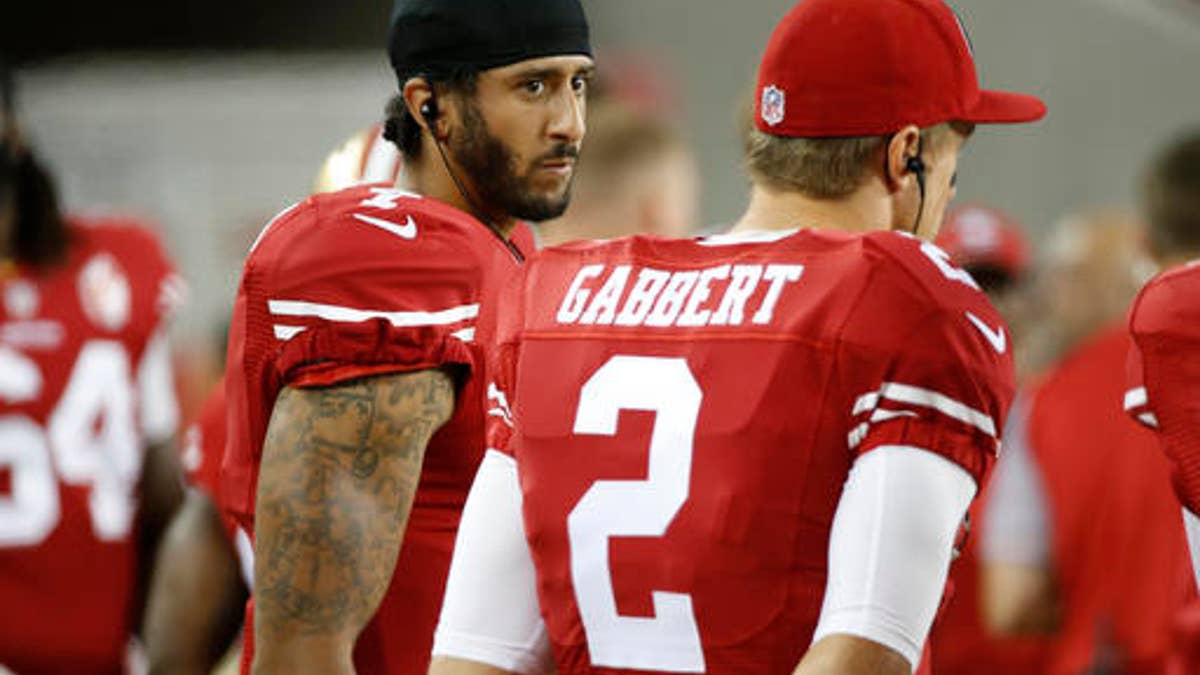
San Francisco 49ers quarterbacks Colin Kaepernick, left, and Blaine Gabbert stand on the sideline during the second half of an NFL preseason football game against the Green Bay Packers on Friday, Aug. 26, 2016, in Santa Clara, Calif. Green Bay won 21-10. (AP Photo/Tony Avelar)
San Francisco Forty-Niners’ quarterback Colin Kaepernick’s decision to kneel during the national anthem has been discussed ad nauseam. Yes, I'm tired of it, too. But as of Sunday there is a new angle to this still developing story.
Sunday marked the first full day of the NFL season. More than that, it marked the fifteenth anniversary of 9/11. As games prepared to kickoff all across the country, the national anthem was sung against the backdrop of field-sized flags, jet fly-bys, military honor guards, and presidential addresses recalling that terrible day. Players could be seen standing tall, proud, and respectful. Like those in the stands, some sang or had a hand over their hearts. Still others held flags.
But not all.
A not-so-subtle subplot to this day of commemoration is that some NFL players—specifically, four Miami Dolphins—elected to join Kaepernick in kneeling, thus making him the leader of a movement.
Americans are not unaccustomed to civic protests: abolitionism, women’s suffrage, civil rights, and so on. The great ones have defined us as a nation. However, the precise nature of the Kaepernick Movement has yet to be seen. Is he MLK or Dennis Rodman? A Civil Rights leader or just another obnoxious athlete with a bad attitude?
For the uninitiated, kneeling is neither new to football nor even to NFL quarterbacks. In 2011, I wrote this column for USA Today defending Tim Tebow who was often seen kneeling to pray before each game. Generally speaking, however, kneeling takes place during the game and is reserved for winning quarterbacks who kneel to run out the clock. Apart from the 2012 season, Kaepernick hasn’t had much opportunity to kneel on the field, but he has more than made up for it off of it.
The reason, we are told, is that he is protesting racism and police brutality. These things are real, run in every direction, and are worthy of a national discussion. But Kaepernick’s movement has achieved something altogether different, and this because there is no logical connection between his actions and the things he is protesting. Rosa Parks refused to go to the back of the bus because black people were not permitted to sit in the front of the bus. The connection was clear. What, exactly, is the connection here? Is Colin Kaepernick telling us that so long as racism and injustice exist in America that he does not think America worthy of his respect? It would seem so.
This got me thinking: Are there things that I don’t like about America? Yes. Quite a few, in fact. Violence against the unborn, the highest violent crime rate in the industrialized world, sordid social agendas, the destruction of the family, high taxes and a creeping socialism are all high on my list. With these things in mind, perhaps I should take a knee, too? Maybe you have your own list of things you don’t like about America. Shall we all kneel and stick it to the man, as they say?
No.
The national anthem is about unity, not division. Think on the words. They tell of a perilous night through which a battle raged. Our nation was on the brink of extinction. When dawn finally came, the sun shone brightly on our tattered flag, giving proof to the fact that we had, indeed, survived as a nation. The story appeals to our better selves by reminding us that we are a people who unite and persevere through troubled times.
By contrast, not only does Colin Kaepernick’s decision to kneel during the national anthem do nothing to advance the cause he advocates, it further divides an already deeply divided nation by unnecessarily offending and alienating people who are in no way guilty of the offenses he decries.
Critics have accused Kaepernick of exhibiting a profound disrespect for the men and women who have given their lives for our country, a charge he has denied. But his associates’ decision to expand their protest on, of all days, the anniversary of 9/11, only further muddled the message he wants to communicate.
In the end, Colin Kaepernick’s protest has generated a national discussion about one thing—Colin Kaepernick’s right to kneel. Surprising to no one, President Obama affirmed his right to kneel. NFL Commissioner Roger Goodell likewise acknowledged his right to kneel. And ESPN commentators have fallen all over themselves defending the back-up quarterback’s right to kneel.
The point is irrelevant.
Of course, Kaepernick can kneel. So far as I know, no one has tried to deny him this trivial right. Rather many have criticized him (as I am doing in this column) for reasons that are not trivial because they recognize what he apparently does not:
That standing for the national anthem is not an affirmation of social injustice; on the contrary, it is a symbolic gesture affirming that we as individuals—divided as we are by color, ethnic background, socio-economic status, and religion—unite in this belief:
“We hold these truths to be self-evident, that all men are created equal, that they are endowed by their Creator with certain unalienable Rights, that among these are Life, Liberty and the pursuit of Happiness.”
So stand, Colin Kaepernick, and continue your battle, denounce tyranny in all of its forms, and in so doing remind us of what this country was meant to be.








































